Many people take casein protein because it absorbs slowly and provides a steady stream of fuel for building muscle.
Casein protein is a type of protein derived from cow’s milk.
While it’s less commonly used as a supplement than its closely related cousin, whey protein, casein protein is useful in situations such as recovering from tough workouts and building muscle gains.
With the increasing popularity of casein protein, there are a lot of brands offering similar formulations.
Whose is the best? Our research team set out to answer that question for you.
Research
Rankings
1. Ladder Sport Protein Powder
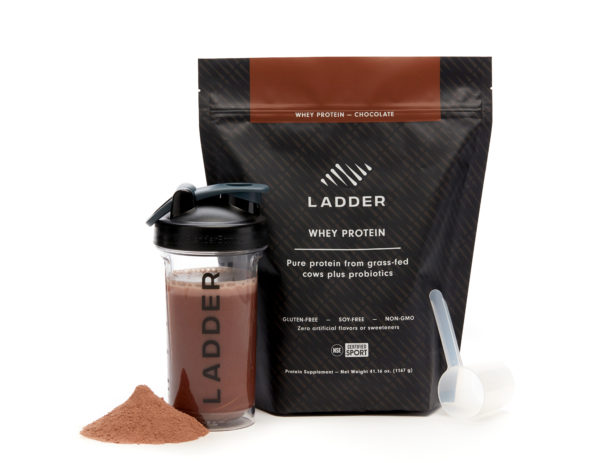
Ladder’s whey protein offers a combination of casein and whey isolate, making it one of the most versatile casein supplements on the market. The whey isolates provide fast acting amino acids, while the casein provides a slow and steady release to ensure optimal protein synthesis.
No fillers, artificial sweeteners or colors are used. Ladder also has the special distinction of being NSF-certified for sport, cementing its place as BodyNutrition’s #1 recommended casein protein powder.
2. BulkSupplements Casein
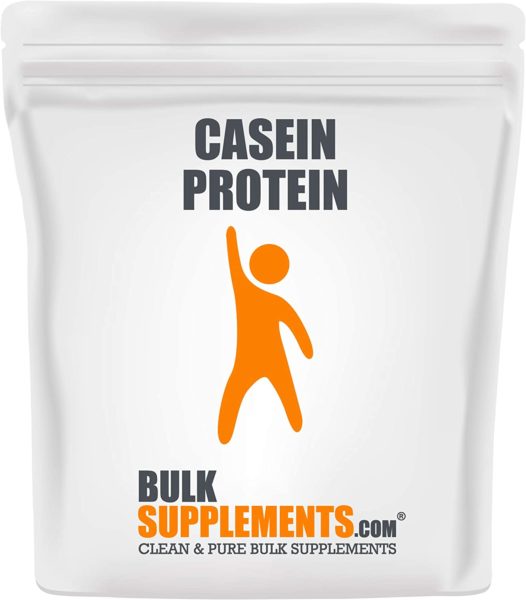
As is usually the case, BulkSupplements does a marvelous job when it comes to the minimalist version of casein protein.
The powder comes in a simple zip-top bag, in quantities of up to 11 pounds. There are only two ingredients, powderized casein and lecithin to emulsify the powder when it is mixed with water.
This simple formulation is great if you don’t want unnecessary extras in your protein powder, but if you don’t like the chalky, chunky taste of plain protein you may not like it as much.
You’ll also have to work harder to get it to mix well into your protein shakes.
3. Naked Casein
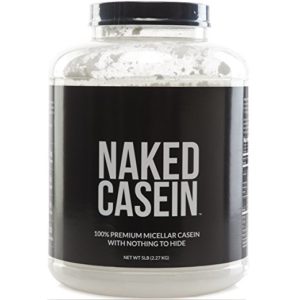
If truly all you want is one hundred percent pure casein protein, Naked Casein is definitely the way to go.
Blending up this protein into a shake or smoothie is going to be challenging because of the lack of any emulsifying agents, so you’ll really need to shake it up, or use a blender, to get Naked Casein to blend well into your solution of choice.
If you are making your own meal replacement or mass gainer, you can add in your own emulsifier as needed.
4. Ascent Native Fuel Casein
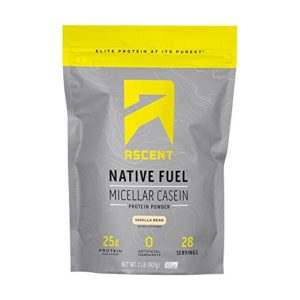
If you want a nice middle of the road casein protein that uses simple and straightforward ingredients, but still tastes good and isn’t difficult to blend into a protein shake, Ascent Native Fuel Casein is an excellent choice.
It uses cocoa powder, natural flavors, and the natural non-caloric sweeteners in monk fruit extract and stevia to ensure a good taste, alongside natural emulsifiers to blend well with liquids, but there aren’t any off-putting artificial ingredients or unnecessary extraneous things included in the formulation.
5. Optimum Nutrition Gold Standard Casein
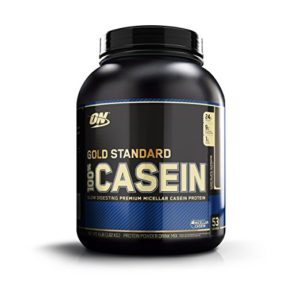
Optimum Nutrition’s casein protein comes in a huge four-pound tub and delivers the casein protein in a micro-powderized form that makes it easy to blend into a drink and resistant to chunking up.
It’s flavored with both natural and artificial flavors, and the mixability is aided further by the inclusion of several emulsifiers.
It’s not going to be the go-to option for protein purists, but if you want functionality above all else, it’s an excellent choice.
6. Legion Casein+
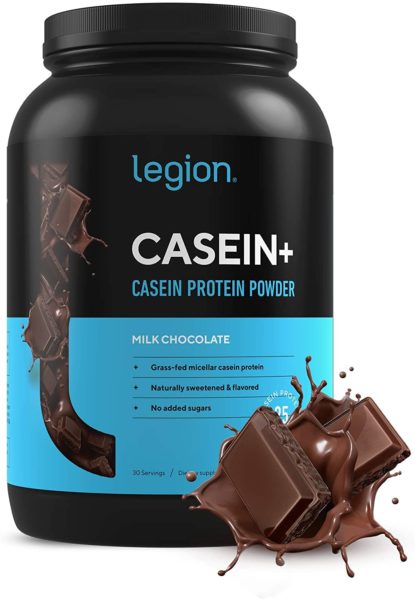
Legion Casein+ is a very pure casein protein that’s flavored only with natural vanilla and stevia, and uses grass-fed cow’s milk as a source for casein protein. The result is a clean, high-quality, and versatile casein protein supplement that’s equally well-suited for athletic performance and for weight loss.
7. Dymatize Elite Casein
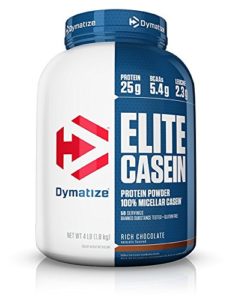
Dymatize’s casein offering is another in the functional protein category.
It’s flavored with cocoa powder, natural flavors, and sucralose, and it uses emulsifiers from soy and sunflower to make the powder easier to mix up into a smoothie or a shake.
The soy ingredients and artificial sweeteners might be a turnoff to some people, but it’s still a solid choice.
8. MuscleTech Nitro Tech Casein Gold
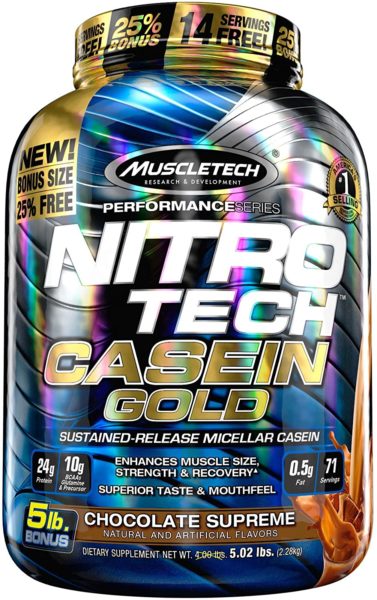
MuscleTech makes a protein powder that will blend up well and taste good, but it accomplishes this by using a hefty amount of artificial flavors, sweeteners, coloring agents, and anti-caking agents.
If you are okay with this, it’s a decent choice, but other manufacturers manage to accomplish the same goals–good taste and easy mixing–without quite so much in the way of extra ingredients.
9. BSN Syntha-6
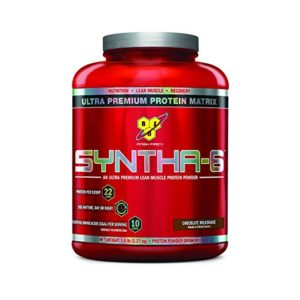
BSN’s Syntha-6 is a protein powder formulations that tries to take advantage of the strengths of both whey and casein protein. Providing a blend of whey, milk, and casein protein, alongside a whole host of sweetening and flavoring agents, this protein powder tends more towards the meal replacement or mass gainer side of the spectrum.
The added extras for health, like MCT oils, are a nice touch, but if your primary goal is taking advantage of the benefits of casein protein, there are better options out there for you.
10. Six Star Casein Protein
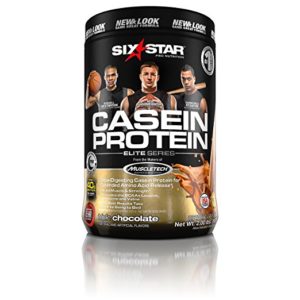
While Six Star Casein Protein is sold as a protein powder, it’s almost closer to being a meal replacement or a mass gainer than just protein.
There’s a substantial amount of maltodextrin in the formulation, which gives it a higher carbohydrate content than plain protein. As you’d expect with a product like this, it’s flavored with natural and artificial flavorings and sweetened with sucralose.
One major downside is that the “casein blend” is actually made up mostly of milk protein isolate; true casein protein is a secondary ingredient. This means you won’t get as much of the benefits of casein, like its slow digestive rate.
Category winners
Best casein protein overall: Ladder Sport Protein Powder
Ladder Sport Protein is the best overall option thanks to its optimized blend of both casein and whey, as well as its clean supplement design. The great taste and clean formulation make it ideal for an all-purpose casein protein supplement.
Best casein protein to take before bed: Naked Casein
Naked Casein is ideally suited for boosting night-time gains thanks to its hyper-pure formulation. The lack of sweeteners and additives means you are only loading your body up with the key essentials for muscle synthesis.
Best casein protein for bulking: Ladder Sport Protein Powder
The great taste and highly effective whey/casein combination of Ladder Sport Protein makes it a fantastic choice for bulking. The rapidly absorbed protein in whey helps accelerate muscle recovery, while the slow steady supply from the casein promotes sustained increases in muscle mass.
Best casein protein for cutting: BulkSupplements Casein
For cutting, you want to keep protein intake high and excess calories low. BulkSupplements Casein is 100% pure, making it a great option for sustaining healthy levels of amino acids without the excess calories from other protein powders that are laden with sugar.
Best casein protein for runners: Ladder Sport Protein Powder
Running can break down a surprising amount of muscle. Ladder Sport’s dual ingredient approach is perfect for post-run recovery, and thanks to the probiotics, you’ll also be fostering a healthy gut microbiome—which is a major help for endurance athletes of all kinds.
Best casein protein for weight loss: Ascent Native Fuel Casein
Casein protein’s slow absorption makes it great as a protein for weight loss, and to this end, Ascent Native Fuel Casein is the best option. It uses pure micellar casein protein that’s sweetened with natural vanilla and non-caloric compounds like monk fruit extract, which makes it taste great while also being free of added sugar.
Who should buy casein?
Casein is a good protein to choose if you want a highly concentrated source of amino acids that are absorbed more slowly than a more expeditiously absorbed protein, like hydrolyzed whey protein powder.
Casein, being a dairy-derived protein like whey, still has all of the same advantages of animal derived protein: namely, it has a solid amount of all of the essential amino acids, including branched chain amino acids or BCAAs for short.
However, it’s better suited for situations where you want a slow, steady rate of absorption, and want to avoid a sharp spike in insulin. As a result, casein containing proteins might have some applications as a protein for weight loss.
Casein is also popular among bodybuilders and strength athletes looking for a protein to take right before bed. They’ll use whey protein or pure BCAAs as their go-to post-workout supplement for the surge of BCAAs into their bloodstream, but opt for casein protein at night to get a slow, steady supply of protein for repairing their muscles as they sleep.
If you want the benefits of a slow release protein, and still want to get the full range of amino acids that are available in animal and dairy-derived proteins, then casein protein is a great choice.
How we ranked
Since casein is a common choice of protein for a before-bed snack, we put a particularly strong emphasis on purity when formulating our rankings. You don’t want any unnecessary ingredients bloating up something you’re going to eat or drink in a protein shake right before bed.
As such, we first gathered all of the casein protein products on the market whose only source of protein was pure casein protein powder. While casein is a common source of protein in protein shakes and meal replacement shakes and has its advantages in those products, these blended preparations were not our focus here.
Having gathered only products that focused on pure casein protein, we then evaluated them on their purity and their efficacy. Some casein is processed into a form called micellar casein protein, in which the protein molecules have been aggregated into cell-like clumps.
This processing form might give casein protein a longer absorption time, though our research team found that many of the products that prominently advertise their micellar form also tend to contain additives.
We put a greater emphasis on purity than on having a verified micellar form, and as a result, the products that came out on top in our final rankings were those that contained only one ingredient: pure casein protein.
Whether you want a simple before-bed protein shake or you are making your own meal replacement shake, you’ll find the casein protein you need in our rankings.
Benefits
Casein protein has several unique properties. While it’s not the most popular protein powder in general, casein protein, which is derived from the protein that is in cow’s milk, has a number of particular benefits that make it very useful for building muscle and recovering from workouts.
Unlike the more popular whey protein, it’s digested slowly by your body, providing a steady stream of protein to build and repair muscle fibers that are stressed during workouts.
The distinctive features of casein protein as compared to its counterpart, whey protein, are well-described in a scientific study published in 2010 in the American Journal of Physiology: Endocrinology and Metabolism by researchers at the Institute of Sports Medicine in Copenhagen, Denmark (1).
The researchers wanted to know how whey and casein protein affected levels of amino acids in the blood following weight training, so they created two protein drinks consisting of casein and protein powder labeled with a special weakly radioactive isotope.
The three groups of subjects drank either a whey protein shake, a casein protein shake, or a control beverage with no protein or carbohydrates in it immediately after a weight lifting protocol.
The researchers found that blood levels of branched chain amino acids rose faster and to a higher peak in the whey protein group, but insulin also rose faster.
Casein protein is absorbed more slowly than whey protein. Aside from that, differences in the overall response to the protein ingestion was quite similar. This suggests that whey and casein protein accomplish many of the same things, but that whey is more rapidly absorbed and leads to a spike in both branched chain amino acids and in insulin after ingestion.
This spike could be a good thing if you want to jump start your recovery or use branched chain amino acids as fuel during exercise, but if you want a steady supply of building blocks for your muscle, casein might be the better choice.
Research published in the British Journal of Nutrition highlighted some additional differences in whey and casein protein (2).
Casein is not quite as good as whey protein at making you feel full. One study, published in 2007, compared whey protein and casein protein in terms of their post-ingestion effects on hunger and amino acid levels in the body.
With respect to the amino acid levels in the blood, the researchers got similar results to previous work: whey protein leads to a more rapid spike in amino acid concentrations, indicating it is absorbed more quickly.
There was one interesting difference, however. Because whey protein appears to be absorbed more quickly, you’d expect it to have a weaker effect on satisfying post-ingestion feelings of hunger.
However, the researchers found the opposite. Feelings of satiety–the sensation of fullness you get after a large meal–were actually larger in the whey protein group than in the casein protein group.
This indicates that there are deeper hormonal responses to whey versus casein protein ingestion.
The micellar form of casein protein could be particularly good for slow, steady protein supply. When casein is processed into a “micellar” form, it forms into cell-sized clumps that are more stable in liquid solutions (4).
One consequence of this configuration of the protein is that it is absorbed significantly slower by your body. If you are looking for a rapid surge of post-workout protein, this might not be ideal, but if you want a steady supply of protein spread out over a longer period of time, micellar casein protein is ideal.
The utility of micellar protein was put to the test in a 2012 study published in the British Journal of Nutrition by a team of researchers in Canada (5). In the study, 14 elderly men were split into two groups who received either a whey protein or casein protein drink after completing a resistance training protocol.
The researchers used a special biochemical technique to measure rates of muscle fiber protein synthesis in the men during the first hour after they had completed the exercise training program. The results showed about what we would expect based on the absorption chemistry of casein protein: muscle fiber protein synthesis rates were higher in the group that took the casein protein.
These results underscore what we already suspected: casein is not the best post-workout protein. Instead, you should use it in situations where you want a slower release of protein over a longer period of time, like right before bed.
Taking casein protein before bed can improve your muscle mass and strength gains. Since a large part of the recovery after a workout happens when you are asleep, it would make sense that supplying your body with a slow-release protein right before this critical time period would lead to improvements in muscle gains.
This hypothesis was examined in a scientific study published in 2015 in the Journal of Nutrition (6). The study assigned a group of young healthy men to two groups, both of which completed a 12-week weight training program.
The first group got a non-caloric placebo drink that they consumed every night before bed, while the second group group received a protein-heavy drink to consume right before going to bed.
After the 12 weeks had elapsed, the researchers examined the results and found that the men who took the protein shakes before bed had increased cross-sectional area in the quadriceps and, more importantly, had increased their one rep max strength by a significant amount.
These results provide quality evidence for something that athletes have suspected for a long time: protein before bed is a great way to achieve better strength gains.
Side effects
Since casein protein is a major constituent of cow’s milk, the side effects profile is almost nonexistent.
If you have a milk allergy, you should stay away from casein protein (as well as other dairy proteins, like whey protein) but even people who are lactose intolerant can usually tolerate casein protein just fine, since the lactose content is so low. Lactose is more of an issue in unprocessed dairy products like milk, soft cheeses, and ice cream.
If you do find yourself getting bloating, gas, digestive issues, or gastrointestinal discomfort, try replacing your casein protein with a vegan protein powder and see if your symptoms get better.
If they do, you might be highly lactose intolerant, or just have a milk allergy, and if that’s the case, casein protein is not the right supplement for you.
Recommended dosage
According to recommendations from M. A. Tarnopolsky and colleagues at McMaster University in Canada, protein requirements are substantially higher for athletes undergoing strength training when compared to the general population (7). These findings make sense, given that muscle protein is built directly from amino acids, which in turn come from your dietary protein intake.
They conducted a study that used advanced methods of tracing whole body protein balance and found that strength training increases the body’s demand for protein to approximately 1.76 grams per kilogram of body mass per day.
This means that a 200 pound athlete (91 kg) would need at least 160 grams of protein per day to sustain maximal strength improvements and muscle mass gains.
Sedentary people can benefit from casein protein too. Their needs are lower, however; according to Tarnopolsky and the other researchers at McMaster University, a sedentary person only needs about 1.0 grams of protein per kilogram of body mass per day to maintain constant muscle mass.
While casein protein is absorbed more slowly than whey protein, it’s still going to be absorbed completely within a few hours, so it’s best to split up your daily protein needs into several smaller servings spread throughout the day.
This is especially true if you are working out more than once per day, as your protein needs will clearly be much higher and your muscles will be in a constant state of turnover.
FAQ
Q: What is casein protein?
A: Casein protein is derived from dairy, and is a byproduct of the manufacture of cheese. Through the action of enzymes, the protein in milk is transformed into a liquid (whey protein) and curds, which contain casein protein. Once the whey protein liquid is washed away, the resulting curds can be processed and dried, resulting in casein protein.
While it’s still a dairy product, casein has different molecular properties than whey protein. Its amino acid content is slightly different, but this is more of an academic difference than a practical one—casein still has all of the essential amino acids, just like whey protein does.
More importantly, however, casein protein is absorbed more slowly than whey protein. While this is not advantageous if you are looking for a quick surge in amino acid levels and muscle protein synthesis after a workout, it’s a great benefit for a bedtime protein to boost muscle repair overnight.
Q: When should you take casein protein?
A: Casein protein is the perfect protein to take at night. Thanks to its slow rate of absorption, casein protein provides a slow, steady supply of amino acids into your body overnight.
Research has found that this kind of pre-bedtime protein leads to significant improvements in muscle size and muscle strength. Another potential application of this same property is using casein protein as a meal replacement in the morning.
A high-protein breakfast can kick-start your metabolism in the morning, and if you want to avoid a rush of insulin, casein protein is better than whey protein for morning protein needs.
Q: What is micellar casein?
A: Micellar casein protein is a form of casein protein that has been processed so it’s configured into spherical macro-molecules that are similar in size and shape to biological cells (hence the name). While this process does not alter the chemistry of casein protein, it does make it slower to absorb.
Micellar casein protein leverages one of the major benefits of casein protein; namely, its relatively slow absorption rate compared to whey protein. Micellar casein protein is the form of casein you should choose if you are most interested in casein as a pre-bedtime recovery aid or as a breakfast replacement.
Q: What is casein protein found in?
A: Since casein is derived from processed dairy, you can find it in plentiful amounts in processed forms of dairy, like cheese, yogurt, cottage cheese, kefir, and milk. Since it is a dairy product, casein is not a vegan source of protein, but it is vegetarian.
Q: Do eggs have casein?
A: No, eggs do not have any casein in them. Casein is only found in any significant amounts in dairy products and their derivatives, so eggs by themselves won’t contain any casein.
That’s not to say that eggs are a poor source of protein generally—quite the opposite, in fact. Egg white protein is a great source of essential amino acids, and is often used in paleo-friendly recipes due to the fact that it is less processed than casein protein.
Q: Is whey protein better than casein?
A: It really depends on the specific application. When it comes to rapid recovery following a tough gym session, whey protein is superior because it is delivered more rapidly to your bloodstream.
Research has confirmed that whey protein consumption after a workout causes a greater increase in muscle protein synthesis than casein protein consumption. Whey protein also seems to stimulate a higher satiety response (i.e. a feeling of fullness), so it may be better for weight loss.
However, casein protein is better suited for a morning or bedtime protein shake thanks to its slow absorption rate. Research has found that protein consumed before bed can boost your strength and muscle gains beyond what you’d get without it.
Q: Does casein protein cause cancer?
A: Some epidemiological research has found that consumption of certain dairy products is associated with an increased risk of prostate cancer, but the results have not been consistent. Some cell-based studies have argued that casein could lead to cancer cell proliferation in certain circumstances (8), however, other research has made this effect look questionable in humans.
Specifically, a meta-analysis of epidemiological evidence found that overall dairy consumption had no effect on cancer mortality (9). Consumption of whole milk, in men, increased the risk of prostate cancer, but it’s hard to jump from this observation to concluding that casein causes cancer.
Why? Two reasons. First, non-milk dairy products like cheese and yogurt have a lot of casein, but they did not increase rates of cancer. Second, it’s extremely hard to isolate the effects of one specific dietary ingredient, because so many food and lifestyle patterns are correlated with one another.
Q: Can you have a casein sensitivity or a casein intolerance?
A: Some people believe that dairy products can provoke immune reactions that lead to vague, chronic health complaints, much like the controversial idea of gluten intolerance (in the absence of celiac disease).
While the topic is certainly controversial, there are nevertheless enough people concerned about dairy intolerance that many products are labeled as casein-free. Note that anyone on a diet that is restricted in casein should also avoid whey protein, as both products contain traces of milk products (including the opposite protein).
Q: Is casein bad for you?
A: No, casein is a great source of protein.The only people who should avoid casein protein are people with milk and dairy allergies, as well as people with severe lactose intolerance.
While the lactose content of casein protein is low, it’s not zero, so you’ll still run the risk of provoking a reaction if you have very little resistance to lactose.
Q: What does casein free mean?
A: Many products are labeled casein-free because a small subset of people seem to have a dairy or milk intolerance that’s provoked primarily by casein.
Much like gluten intolerance, dairy intolerance is not well-understood, but some people believe that even exposure to small amounts of milk-derived ingredients, like casein protein, can provoke a negative reaction by their body.
Just like with gluten, the vast majority of people do not need to worry about this unless they’ve been specifically advised to go on a dairy-free diet.
Related articles
- Whey protein
- Protein for weight loss
- Meal replacement shakes
- Protein shakes
- Vegan protein powder
- Paleo protein powder
Recap
Casein protein is a slow-acting counterpart to whey protein.
While whey protein is great if you want an immediate boost of amino acid levels in your blood, or if you want to be burning branched chain amino acids as fuel during a workout, for a steady stream of protein delivered to your muscles, casein works best.
If you are engaging in strength training, you should shoot for 1.76 grams of protein per kilogram of body mass per day–remember this is total protein, so include other sources of protein in your diet for this calculation as well.
People who aren’t weight lifters or strength athletes have lower needs for protein; they should aim for one gram of protein per kilogram of body mass per day.
For BodyNutrition‘s #1 casein protein recommendation, click here.